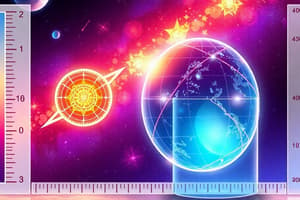Podcast
Questions and Answers
What is the definition of accuracy in measurements?
What is the definition of accuracy in measurements?
- The level of variation in repeated measurements
- The consistency of measurement results over time
- The closeness of measurements to each other
- The closeness of measurements to the actual value (correct)
Which of the following examples best illustrates precision?
Which of the following examples best illustrates precision?
- Measuring the weight of an object three times and getting 5.1 kg, 5.1 kg, and 5.2 kg. (correct)
- Measuring the temperature of water and getting 25°C, 30°C, and 25°C.
- Measuring the length of an object with values of 2.0 cm, 3.0 cm, and 2.5 cm.
- Measuring the height of a building and consistently getting values around 100 m.
What determines the precision of a set of measurements?
What determines the precision of a set of measurements?
- How close the measurements are to the true value
- The standard value against which measurements are compared
- The spread of the measured values in the set (correct)
- The method of measurement used
Which statement is true regarding accuracy and precision?
Which statement is true regarding accuracy and precision?
If three measurements of a standard length are 10.0 in., 10.1 in., and 10.1 in., what can be concluded about their accuracy?
If three measurements of a standard length are 10.0 in., 10.1 in., and 10.1 in., what can be concluded about their accuracy?
How does one assess the precision of a measurement series?
How does one assess the precision of a measurement series?
What is a potential outcome of measurements being precise but not accurate?
What is a potential outcome of measurements being precise but not accurate?
In the printer paper measurement example, what did the range of the measurements indicate?
In the printer paper measurement example, what did the range of the measurements indicate?
Which statement about significant figures is correct?
Which statement about significant figures is correct?
How many significant figures are in the measurement 0.0045 m?
How many significant figures are in the measurement 0.0045 m?
In the number 2020.0, how many significant figures are present?
In the number 2020.0, how many significant figures are present?
When rounding off the number 6.567 to three significant figures, what is the result?
When rounding off the number 6.567 to three significant figures, what is the result?
How would you express 0.07080 km in terms of significant figures?
How would you express 0.07080 km in terms of significant figures?
What is the proper significant figure representation of the measurement 543.0 L?
What is the proper significant figure representation of the measurement 543.0 L?
Which of the following numbers has the greatest number of significant figures?
Which of the following numbers has the greatest number of significant figures?
If a number is rounded and the digit to be dropped is less than 5, what happens?
If a number is rounded and the digit to be dropped is less than 5, what happens?
What is the correct standard notation for the scientific notation $6.98 \times 10^9$?
What is the correct standard notation for the scientific notation $6.98 \times 10^9$?
How many places would the decimal point move to convert $0.00698$ into scientific notation?
How many places would the decimal point move to convert $0.00698$ into scientific notation?
What does a negative exponent indicate when converting from scientific notation to standard notation?
What does a negative exponent indicate when converting from scientific notation to standard notation?
What is the standard notation for the scientific notation $9.30 \times 10^6$?
What is the standard notation for the scientific notation $9.30 \times 10^6$?
When converting the number $8 \times 10^{-2}$ to standard notation, what is the resulting value?
When converting the number $8 \times 10^{-2}$ to standard notation, what is the resulting value?
What is the result of rounding 235 g to two significant figures?
What is the result of rounding 235 g to two significant figures?
When rounding 785 cm to one significant figure, what is the result?
When rounding 785 cm to one significant figure, what is the result?
How should the number 4,123 kg be rounded off to three significant figures?
How should the number 4,123 kg be rounded off to three significant figures?
What is the outcome when rounding 705 Ohms to one significant figure?
What is the outcome when rounding 705 Ohms to one significant figure?
What is the correct representation of 0.37754 A rounded to three significant figures?
What is the correct representation of 0.37754 A rounded to three significant figures?
If the digit to be dropped is a 5 and the retained digit is odd, what action should be taken?
If the digit to be dropped is a 5 and the retained digit is odd, what action should be taken?
What is the scientific notation of 1.66054 x 10^-24 kg?
What is the scientific notation of 1.66054 x 10^-24 kg?
How is the exponent determined when converting from standard notation to scientific notation?
How is the exponent determined when converting from standard notation to scientific notation?
Flashcards are hidden until you start studying
Study Notes
Accuracy and Precision
- Accuracy measures how close a measurement is to the true or accepted value, e.g., measuring printer paper length close to 11.0 inches.
- Precision assesses the closeness of repeated measurements to each other, indicating the consistency of results under identical conditions.
- The range of values is a method for evaluating precision, calculated as the difference between the highest and lowest measured values; lower range indicates higher precision.
- Possible scenarios: Measurements can be accurate but not precise, precise but not accurate, or both accurate and precise.
Significant Figures
- Significant figures indicate the precision of a measurement device; more significant figures imply greater accuracy.
- Key rules for identifying significant figures:
- Non-zero digits are always significant.
- Leading zeros do not count as significant.
- Zeros between significant digits are significant.
- Trailing zeros count as significant only if there is a decimal point.
- Rounding off rules:
- If the digit dropped is greater than 5, increase the last retained digit by one.
- If the digit is less than 5, simply drop it; no increase needed.
- For a dropped digit equal to 5, round to the nearest even number.
Scientific Notation
- Utilized for dealing with very large or very small numbers to streamline calculations.
- Form consists of a digit term (1-9) and an exponential term (power of ten).
- Scientific notation conversion:
- Copy significant digits, moving the decimal point to the right for large numbers and left for small numbers.
- Count movements and assign positive or negative signs to the exponent based on direction.
- Conversion examples:
- Standard Notation (6,980,000,000) converts to Scientific Notation (6.98 x 10^9).
- Small numbers, like 0.00698, convert to (6.98 x 10^-3).
From Standard to Scientific Notation
- Move the decimal point right for positive exponents and left for negative exponents to convert between notations.
- Understanding movement direction is crucial for determining the sign of the exponent.
From Scientific to Standard Notation
- Revert the process: move the decimal according to the exponent’s positive or negative sign.
- Accurate movement results in correct representation in standard form.
This structured approach aids in mastering the foundational concepts of accuracy, precision, significant figures, and scientific notation in physics and measurements.
Studying That Suits You
Use AI to generate personalized quizzes and flashcards to suit your learning preferences.




